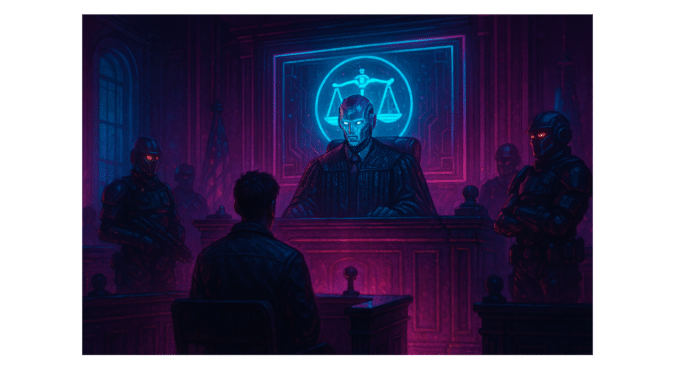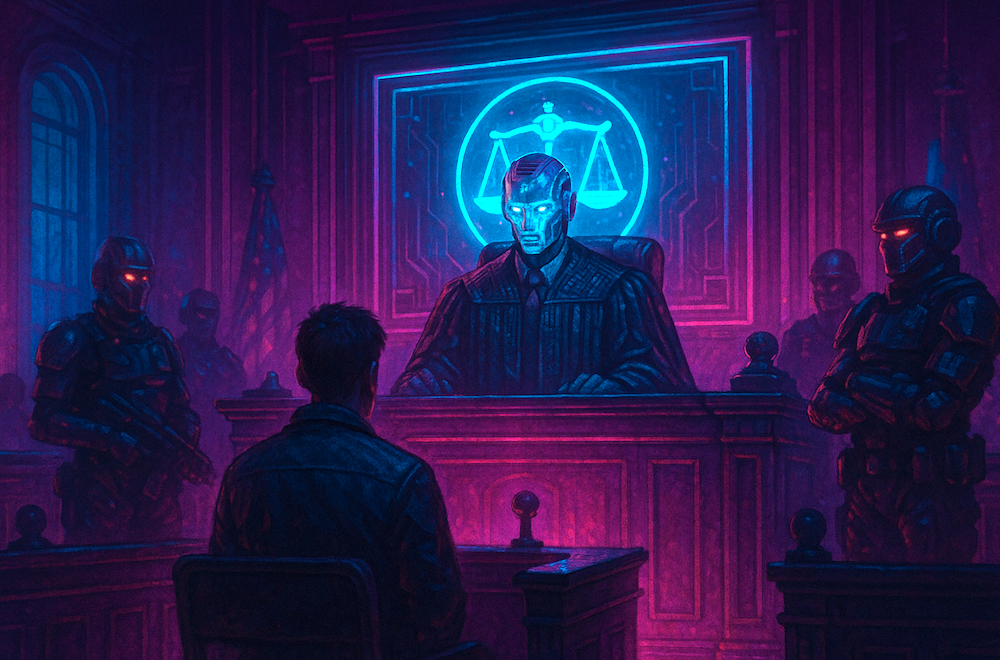
As AI moves deeper into our lives, the subject of ‘AI judges’ often comes up – generating both fear and excitement at the prospect. Innovative Australian law firm Lander & Rogers held a debate on the subject. Here’s how it went. It covered accuracy, bias, and liability.
- ‘Through a fictional embezzlement case set in 2035, the firm examined the ethics of AI-led justice in a world where humans and machines share decision-making power.
- Australian Judge Nell Skinner, Oxford-trained ethicist Dr. Peter Collins, and Lander & Rogers partner Matt McMillan debated an AI sentencing decision, sparking lively discussion at the event at SXSW Sydney on the balance between technology and human judgement.
- The session, led by Courtney Blackman at the firm, combined interactive storytelling, real-time audience voting, and deep ethical and legal inquiry delivering a thought-provoking glimpse into the justice system of tomorrow.’
The project built on the firm’s event last year that explored whether a defendant could successfully use AI in court to help them. The session surfaced a range of critical questions for the future of justice, they noted, which included:
- Who should hold ultimate authority in sentencing: humans or machines?
- Would offenders, victims or the public trust machines to make sentencing decisions?
- Can AI truly understand human behaviour and context?
In terms of the key comments from the discussion, one view was that AI would be ‘less biased ... than humans,’. Dr Collins said: ‘As an example, I would use AI, if I were a doctor, to improve clinical care. But I would always leave the decision making to the doctor and the nurses. We do it [use AI] in education, we do it in all sorts of fields. It’s not exceptional. I think the thing that AI is brilliant at is sweeping up data.
‘We have to be very thoughtful. We have to work through this in a slower and thorough way. We have to work out where the reliable data is and also whether the data has integrity. Unfortunately, when it comes to crime statistics, data has been falsified.
‘Ultimately, AI is actually more ethical than human beings because it’s not necessarily swayed by bias. The limitation of our decision making is the limitation of our cognitive function. We’re hardwired for stereotypes.’
(On that one, AL would say that AI systems are just as biased as any human, as either via the data they ingest, or the adjustments made to their outputs before the model goes live, biases of all types will enter the system. There is no escape from bias, there are only the biases that we accept – and hence we tend not to see them as negative things, i.e. ‘a bias’, but they are there nonetheless, and always will be.)
Meanwhile, McMillan, a partner at the firm, talked about how a machine making a mistake in a future matter would be dealt with and what a future appeal process might look like.
He commented: ‘We’ve all used ChatGPT at some stage, got a response, and thought that’s not quite right. But when you translate that to a courtroom setting and the AI hallucinates, or it makes a mistake, it misreads a witness statement, or it makes a recommendation for too harsh a sentence in the circumstances, then we’re starting to play with someone’s liberty.
‘And that raises the questions: who should be responsible for that? Is that the coder? Is it the judge that relied on it? Is it the agency that’s rolled out the AI solution? When you look at our traditional liability frameworks, they often assume that there’s a human that you can point to. There are concepts of duties and standards of care and intent that you can trace back to. But AI muddies that because what if it is bias in the data that the system’s been trained on? What if it is a glitch with the algorithm? What if it is an edge case which hasn’t actually been thought of by the parties?
‘And if we hold developers liable, then that can start to stifle or chill AI innovation in the justice system and all the wonderful things that AI can actually do for the justice system in terms of the efficiencies. On the other hand, if we’re shielding the developers, then it can really impact people’s recourse in those circumstances. I think a middle path might be to look at AI tools in a courtroom setting as high risk, and to put them through rigorous certifications and ongoing audits so that if a mistake does arise, you can pinpoint the error and trace back through to where the failure has occurred in the process.’
Also on a point about appeals, McMillan added: ‘You could foresee a situation where a person asks for a new hearing, but also asks for a code review alongside that. In those circumstances it’s not just reviewing the same facts, but it’s looking at the AI system itself. What were the inputs into the AI system? What were the guardrails? And what are the outputs and the confidence levels around those outputs?
‘At the end of the day, machines aren’t there to replace judges. I look at AI for judges a bit like the GPS system. It can provide you with helpful directions, but the driver remains responsible.’
(And AL would say even asking an AI ‘what should I do?’ when it comes to judging another person in court seems like a very risky proposition, even if a human judge makes the final decision.)
–

Overall, AL has got to say that much as this site is a huge supporter of using AI to improve the means of legal production, i.e. replacing process work that lawyers do, which creates unnecessary costs and is in effect a tax and a brake on the operation of the economy,…..when it comes to a judge making a decision that could in effect bring to an end a person’s life, or at least the life they currently lead, then a human has to be the one who makes that decision – and the one who gathers their thoughts together to make that decision. Using AI to steer a judge’s thoughts, who then makes the final call, is just as bad as an AI doing the whole thing. Human judgment is why we have judges, after all.
They can be helped by AI, e.g. helping to wade through case notes or previous hearings to surface facts and data, but the actual, final decision and thought processes around it has to be that of a human. As noted before in AL, the problem with allowing a piece of software to control justice is that the software is built by people and corporations who are detached from the actual system and are hidden from society’s view. (And of course, have their own biases that are in their favour.)
Justice just about works because people have some faith in it. If AI tools created by private companies, which are very far away from the people, made legal decisions about our lives, then the gap between those with power and those who are subject to that power becomes far too great. There is also a serious question about legitimacy in such a scenario.
AL’s guess is that eventually people would begin to refuse such AI judgments and that would lead to an erosion of law and order. Faith in the system could collapse. And that would be terminal for stability.
As ever with AI, the key aspect is to see its use in context. Plus, just because something can be done, doesn’t mean that it should be done.
Thanks to Lander & Rogers (which also runs a legal tech incubator) for the illuminating project.
–
(Picture by GPT 5, prompts by AL.)
–
Legal Innovators Conferences in London and New York – November ’25
If you’d like to stay ahead of the legal AI curve then come along to Legal Innovators New York, Nov 19 + 20 and also, Legal Innovators UK – Nov 4 + 5 + 6, where the brightest minds will be sharing their insights on where we are now and where we are heading.
Legal Innovators UK arrives first, with: Law Firm Day on Nov 4th, then Inhouse Day, on the 5th, and then our new Litigation Day on the 6th.


Both events, as always, are organised by the Cosmonauts team!
Please get in contact with them if you’d like to take part.
Discover more from Artificial Lawyer
Subscribe to get the latest posts sent to your email.